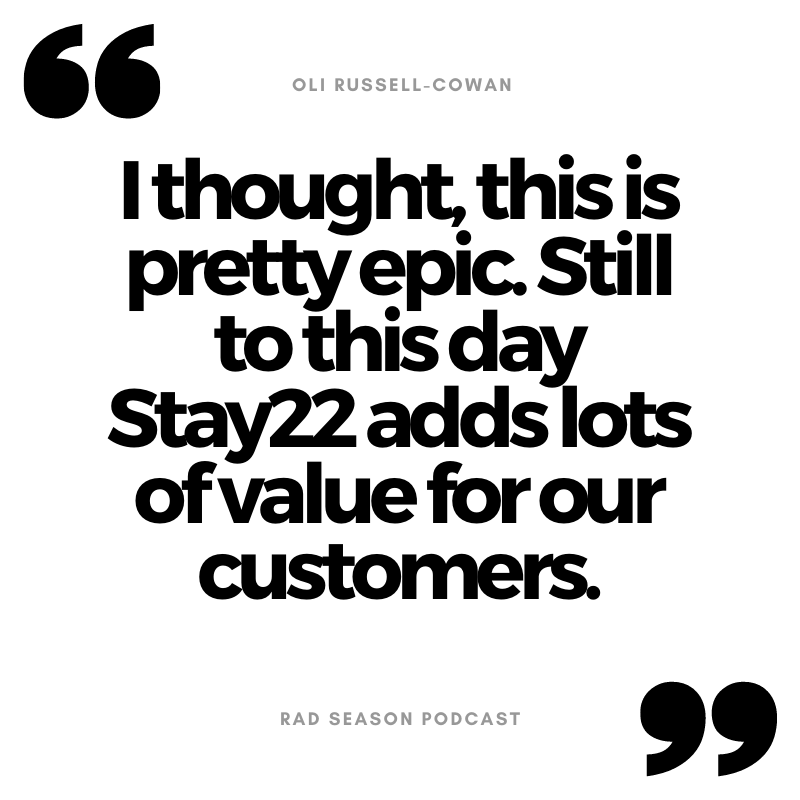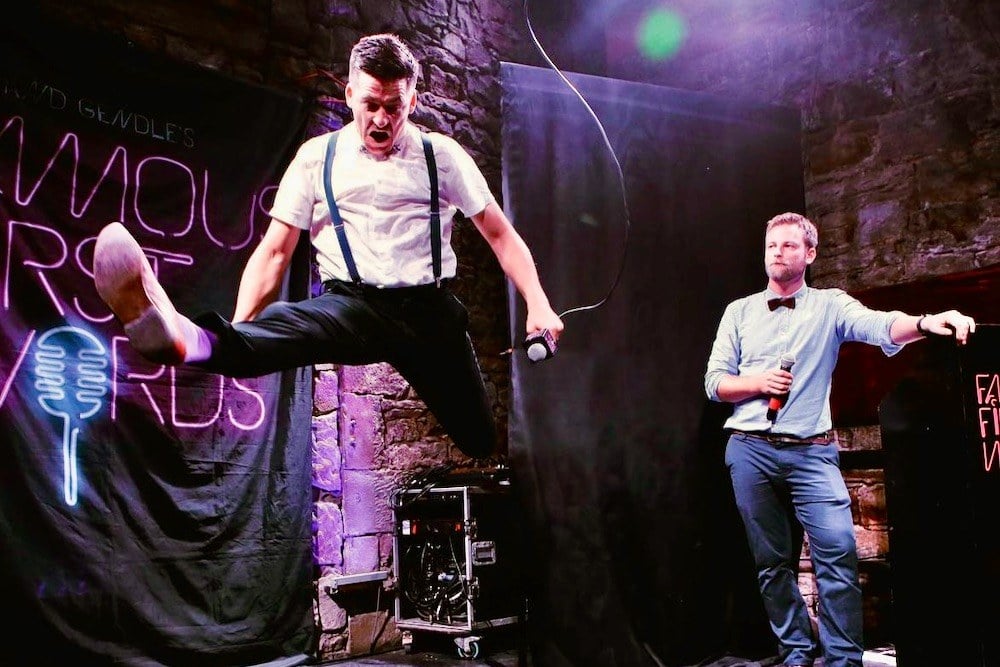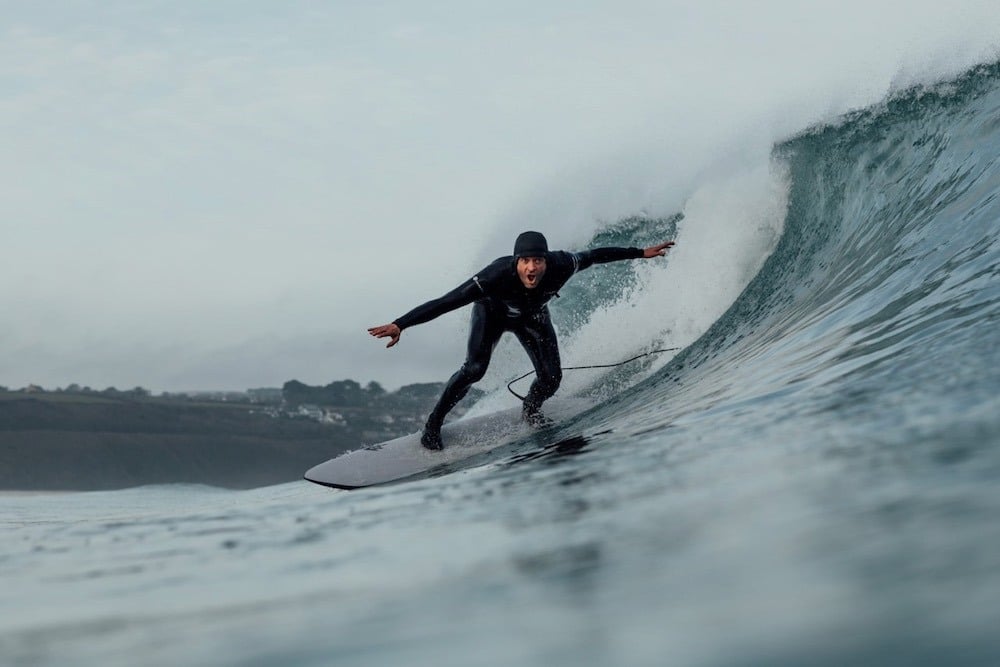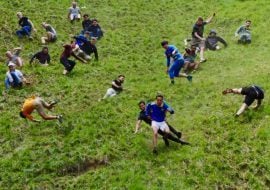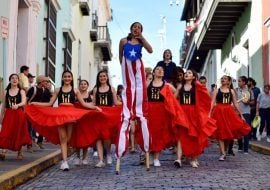Event Travel: Andrew Lockhead
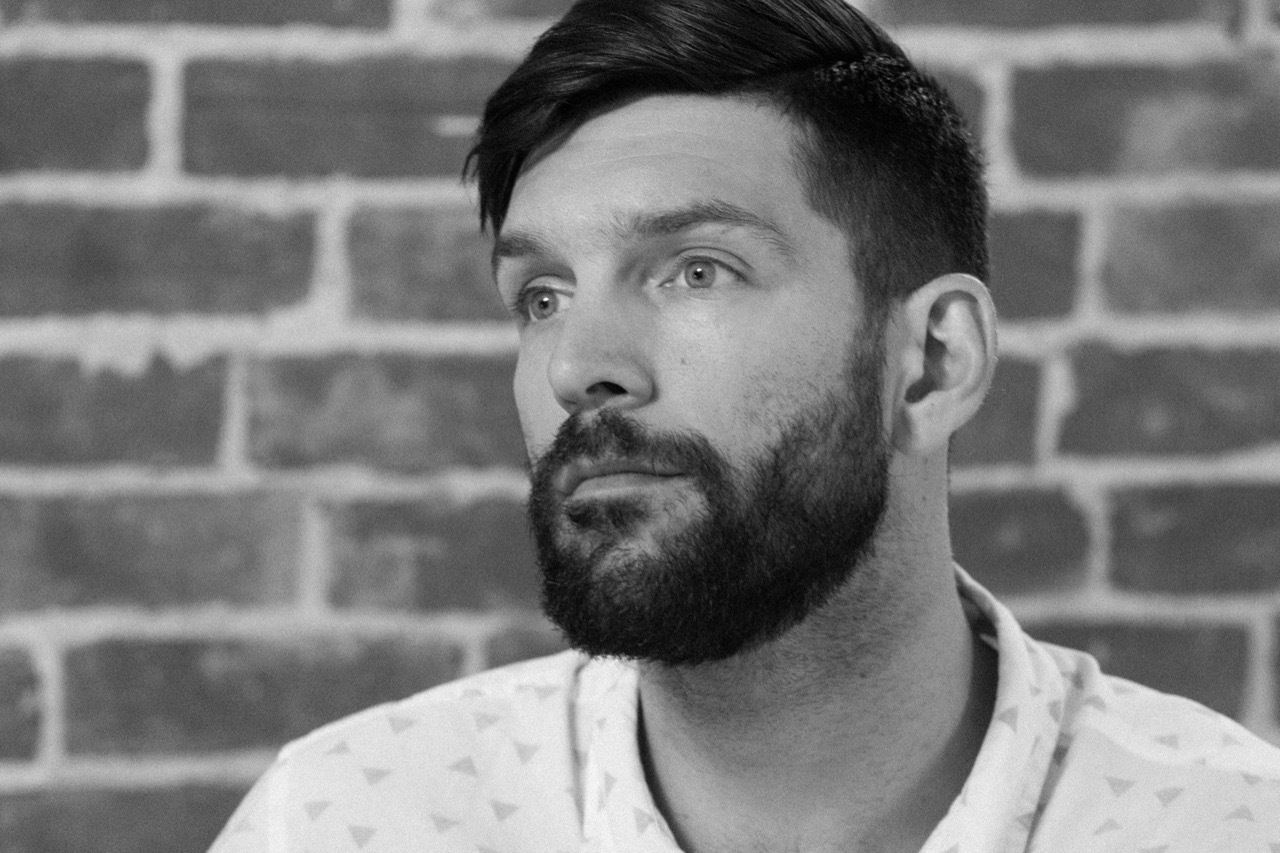

Episode 22: Podcast with Andrew Lockhead, CEO and Co-Founder of Stay22
In the next episode Oli Russell-Cowan chats to Canadian travel and entertainment entrepreneur, CEO and co-founder of Stay22 Andrew Lockhead. In 2016 native Montrealers, Andrew and co-founder Hamed came up with the concept of Stay22, a location-based and interactive map that helps event-goers and travelers book accommodations and travel experiences near events or destinations.
The challenge for event and festival goers is there are so many accommodation sites to choose from. The goal was to make travel easy so they created a map to search and compare the hotels and Airbnb’s near the event location.
Andrew is passionate about revolutionizing the events industry. Tune in to find out how Stay22 got started and get the industry insight from Andrew on how he sees the future of event travel moving forward post-pandemic.
Listen to the podcast:
Dive in and listen to this episode on Apple Podcast and Spotify.

Read the transcript:
Oli Russell-Cowan: Hi guys, it’s Oli from Rad Season. I’m stoked today to be joined by entrepreneur and co-founder of Stay22 Andrew Lockhead.
Andrew, thanks for coming on the show, man.
Andrew Lockhead: Thanks for hosting me.
Oli: No worries. Whereabouts are the moment date?
Andrew: Montreal, Canada.
Oli: What’s it been like over there with the infamous Corona?
Andrew: We kind of reopened a few things. So now people we are able to go back to bars and restaurants and go outside. Now we’re just about to hit our second streak. The second wave is about to come up. We see that there are more people getting infected and more cases. Hospitals are getting busier than ever so we feel it’s about to go down once more. They’re probably going to restrict people going out, ask us to wear masks. It’s going to be a big challenge.
Oli: Do you think that’s because it’s getting colder?
Andrew: No clue, right? People are always like, Montreal is so cold people must be sticking together or something of the sort. But we don’t know exactly we feel like it’s just a few places where people decided to step outside of the norm, so like not wearing a mask, not using distancing. They just catch it and spread it around and now we have to close neighborhoods and make sure people are not putting it too much out there.
Oli: I’d love to talk about where you grew up. You’re originally from Montreal, is that right?
Andrew: Exactly. Born and raised in Montreal until I was about 7 years old.
The Startup Journey
Oli: When did you first get into startups? How did that begin?
Andrew: Startup wise, right after I finished college. But business, I started to get involved in business around 14 or 15 years old. I was working in a family shop. So nothing technology savvy. It was a car shop. That’s where I got my classes. I learned from my dad and his partners about how to do sales, marketing and customer relations.
Startup wise, I was leading my own company and being my own boss right after university.
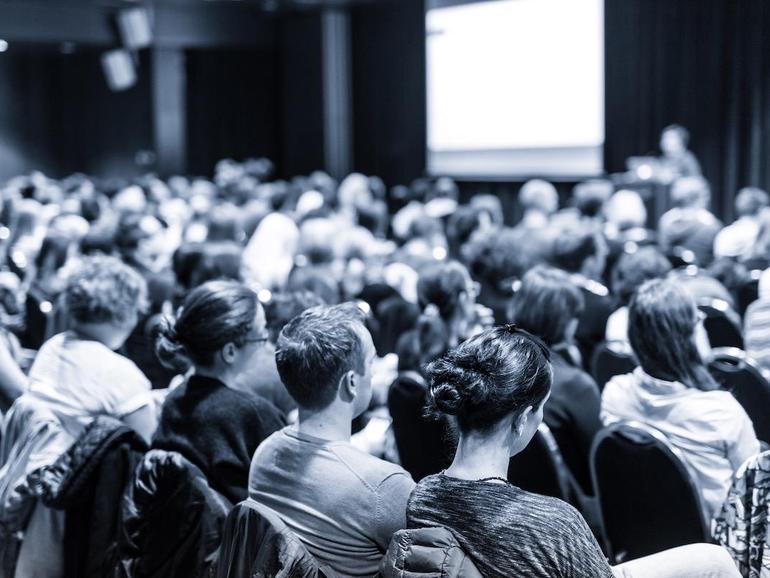
Ticketing Platform
Oli: What was that? What did you go into?
Andrew: My first company was a ticketing platform. Back in 2016, I was the president of my student union. I was hosting all these college parties and balls. Usually, people were only paying in cash. During the evening, I was going on the dance floor with $10,000 in my pocket, not feeling safe at all, like I was going to get robbed or something.
It was before Eventbrite came in. I’m like, there must be a better way. That’s how we found a way to create, StudentSphere. It’s a platform where people can actually promote events and sell tickets online. It was a perfect way for me to just be at college while earning some money from people attending my events. It was a perfect fit.
Oli: That’s cool. Were you doing that just in your college? Or did you then think okay, we can spread out to other colleges?
Andrew: Exactly, so one college after another, similar to what Facebook did. After we got a great foothold in one we just expanded and expanded. At one point, we were the biggest one in Canada, which is not the case anymore. But StudentSphere is still the biggest ticketing platform in Quebec for students.
Oli: Did you partner with anyone to do that? Or is that something that you set up on your own?
Andrew: I’m not a solo guy. I love having someone that can go with me. I’m a super-emotional person so I go through a roller coaster all the time. Either I’m going to own the world or the other half of the time. I’m like, it’s not working. I want to get out, I’m going to kill myself. It’s not great as I wanted it. I need someone stable with me to make sure it’s not happening.
Oli: Bouncing ideas back and forth as well.
Andrew: Exactly. I’m more the business guy, taking care of sales contracts and management. Usually, I find partners more on the tech side. Someone that can grow and lead a tech team because I’m definitely clueless about that part of the business.
Oli: So were there two of you who did that company when you set that up?
Andrew: That was a different one. My other partners were a bit more on the business side. So this was my first mistake as an entrepreneur. We both were business people. So we had to find a third partner that was on the tech side and that took me two years to get through.
So a lot of mistakes. I lost about $40,000 during the first year because of that. Because of that mistake, I was like, No fucking way. Now it’s only going to be about finding a co-founder with tech skills. That’s what I need to get things going.
Oli: After that what was the journey?
Andrew: So five years in, we grew up to about eight employees. But doing business for five years kind of felt like you’ve been through everything where we’re not scaling as fast as expected. I was not able to raise money either. It was a regular bootstrap company that was growing slowly but surely.
After five years, I tried to do something else, where I was getting into the subscription monkey box. I was sending preservatives through boxes to the parents of kids. Condoms. I was just sending them a package every month so their children don’t get AIDS, STD’S or anything else.
Oli: Why did you switch?
Andrew: I was super good at B2B, I like doing sales. I was smart on that side and I was missing the B2C aspect of marketing. I wanted to see if I can scale a company doing retail, actually shipping real products to people.
This one had been a total failure. 9 months in I had to kill the project and jump to the next one.
Oli: I guess along the way there was quite a lot of learnings.
Andrew: The first one that came out is because obviously I’m from Montreal. I didn’t do a proper business plan with all of the factors under risk, right.
We opened up a shop in August. Coming to Christmas time, I didn’t think about the fact that we needed to send those preservatives in a heated box or find a way to deliver them to the people while they can sit above the frozen temperature. So at one point, we’re just like, it’s not sustainable. I cannot just shut down the company for four months and reopen and we just decided to just let it go.
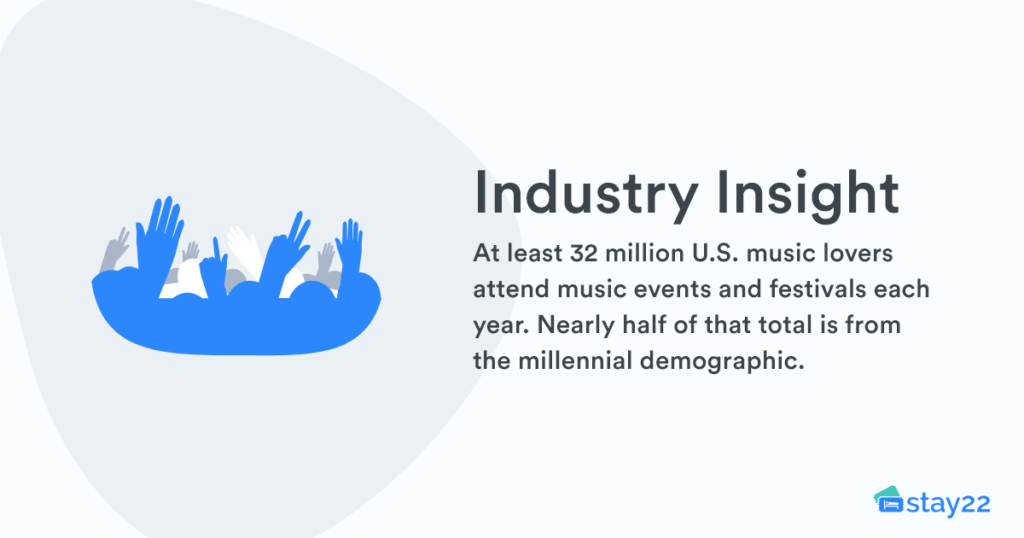
The start of Stay22
Oli: Then what happened? Did you then look at doing another company?
Andrew: Exactly, the next move for me is when I met my other co-founder Hamad.
He was actually the one that raised money for a previous startup. He was in travel. He told me about this problem. I’m like, I understand what’s happening. His company was shutting down. I’m like, Okay, let’s find something where we can work together on that. I know how to get a user for almost free and I know how I can get those people to sell them products like hotels or b&b’s, restaurants, parking and so on. And as we decided to jump ship together.
Oli: I first met you guys back in 2016 when I was starting Rad Season. Was that the first year for you guys?
Andrew: You were one of the first five customers that trusted us. Thanks again.
Oli: I saw what you guys were doing. What I was trying to build with Rad was to put all these epic events and festivals together. The issue was that when you find out about an event, where do you stay?
So there’s all these different options and hotels and Airbnb’s. I saw what you guys are doing the map, which basically has all of them where the venue is the event or festival that you’re going to go to.
Startup Incubators
Oli: How did you guys go about building Stay22? How did it start?
Andrew: We followed the regular startup journey. After knowing each other for about four weeks we got accepted into an incubator in Denver, Colorado. Coming from Montreal working from a small coffee shop. It’s like, hey, come over here. We’ll pay you $35,000 so you can spend four months with us.
So Hamad left his family. I left my girlfriend and we decided to jump ship. We rented an Airbnb in Denver and attend a four-month program for an incubator over there. And that was just amazing.
I know nothing at all about travel. And those guys gave me my one on one class. What is an online travel agency? What are global distribution systems and so on? I was kind of learning it the hard way.
That’s where we decided to work with events and work out a platform. After we came back from Denver, we had an MVP in place. It was working pretty well, but not scalable then.
We got accepted into Montreal’s biggest accelerator called FounderFuel. So now it was a $100,000 12-weeks program, and we need to scale that company. So we moved from a team of two to eight within a 12-week span. That’s where the business really launched, getting more events and more partners. That’s how Stay22 became what it is today.
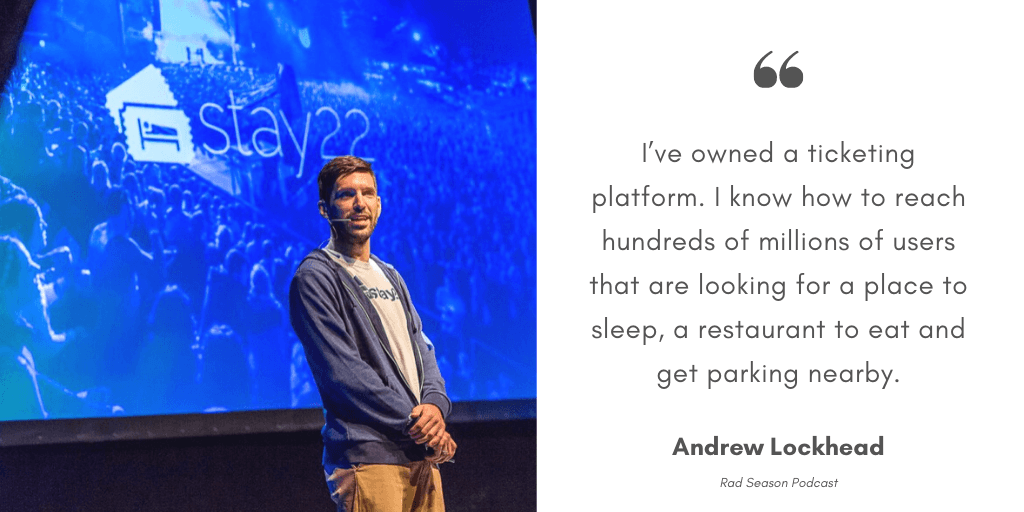
Oli: Awesome. So Hamed was coming from the tech side. Wasn’t he running a company before that in the same industry on events or within travel?
Andrew: Only travel. His biggest mistake was, he was trying to fight against Expedia and Booking.com on their turf. Like on SEO and SEM which is almost impossible. You don’t have that marketing budget to own them. I was like stop going head to head against them and trying to find a way where we can just be lazy and reach those users. High intense users during a transaction process, we know for a fact that are looking to travel. For me, I’m coming from the event industry. I’ve been owning companies in the past. I’ve owned a ticketing platform. I know how to reach hundreds of millions of users that are looking for a place to sleep, a restaurant to eat and get parking nearby.
Let’s get those people right at the perfect time. This is why Stay22 is doing so well is because we know when the user is reaching out.

Oli: What would you say were the biggest barriers during that initial time of building Stay22?
Andrew: Getting the first customer.
It’s so hard when you’re reaching out to the Eventbrites of this world and they are like, ‘who the fuck are you?’ We’re a small team of two people building something great. Believe me, it doesn’t work.
So you need to get things in the right order. So we first started off with smaller events, smaller aggregators, that trusted us like yourself and decided to do a leap of faith and say, You know what, let’s give you a shot and we’ll see what happens.
I remember one of our first customers asked us for a letter of reference from an investor saying that we were are a safe company and we’re going to have enough runway. So it wasn’t one great way to just get those things. As we were getting bigger partners we were able to onboard more partners as well. That’s how we ended up last year with CES and South by Southwest and working with bigger companies with time.
Oli: Were you trying to focus on individual events as well as different platforms?
Andrew: Actually, I always wanted to go for volume. Overall, we’re not making that much money per booking. So we need to get a ton of them to be sustainable.
I always wanted to work with a ticketing platform. I was owning one in the past and I knew my competitors. I knew what they were looking for. The sales pitch was easy for me. But when it came up at Travelport, I was reaching out to them and they didn’t give a shit. They didn’t know us. We didn’t have any brand authority. We didn’t have any business case, my deck was awful. No way they would give us a shot and put us on millions of landing pages. It wasn’t going to happen.
Now we started with the first step events. Events are going to take a week and a half to close, so super fast. It’s not going to bring much money but I knew that I could get those people fast. This is how we went up to Founderfuel. This is how we raised money. As soon as the money hit the bank, we started to work with platforms. That’s how we switched the business to do what we wanted. But at first, nobody trusted us to do it.
The event industry at the start of the pandemic
Oli: That’s pretty interesting, man. You guys over those last couple years were growing, building the team, growing the number of events and platforms on board. With what happened this year with not just the travel industry, but also the events industry, the entertainment industry. Did everything just stop?
Andrew: It was just like we hit a wall man. We were doing 4x year over a year since we launched a company. We were doing $25 million of business last year, but we’re supposed to do about 100 million dollars of gross sell in 2020.
Things were amazing, we had a team of 25, hitting our numbers, we were on fucking fire. I’m not joking. I was so happy building that team. Those people were super resourceful. I was feeling invincible.
Then we heard about COVID in Asia. We figured it was too far off to matter. One of our advisors warned us, “If you manage to get the same number as last year, you’ll be doing great.” That’s when we realized even industries we never thought about — like offshore platforms and unregulated spaces, including sectors like casino utan svensk licens — were starting to feel the ripple effects. But we shrugged it off at the time. We had bigger projects, and we thought we’d power through.
Around the 15th of March, we heard the news. The States were closing the border with Europe. We felt, okay, this is bigger than expected. What’s happening now and within a week spend, we lost about 95% of our revenue, so more than about $200,000 of sales per month.
Oli: I remember I was in Germany at Cologne Carnival, one of the biggest carnivals in Europe in February. The website traffic was great. We were getting a couple of bookings every day, things were good. Then I heard that two people in the carnival had Coronavirus. I didn’t think much of it, you know, it won’t last very long. Then come middle of March, when they announced the borders were closing. The traffic on our site just tanked overnight.
Event Travel Predictions
We’re lucky that we are not in the situation of actually running the events. There was a bit of pivoting going on. What are you seeing now? Are you guys looking at your data and forecasting?
Andrew: That’s what we’re doing every week. If it’s not every day at this point. We’re just trying to see when the second trend is going to go up. There are a few things that are changing around right now.
One of the things that we’re tracking is what’s the difference between Airbnb’s or short term rentals vs hotels? There’s a big challenge. What does the booking window look like? Are people booking more in advance or they’re going to book closer to the date so they can cancel as well?
What’s the difference between let’s say, Europe and the United States or North America. We’re kind of tracking what’s happening all around the world to know when is going to be the boom.
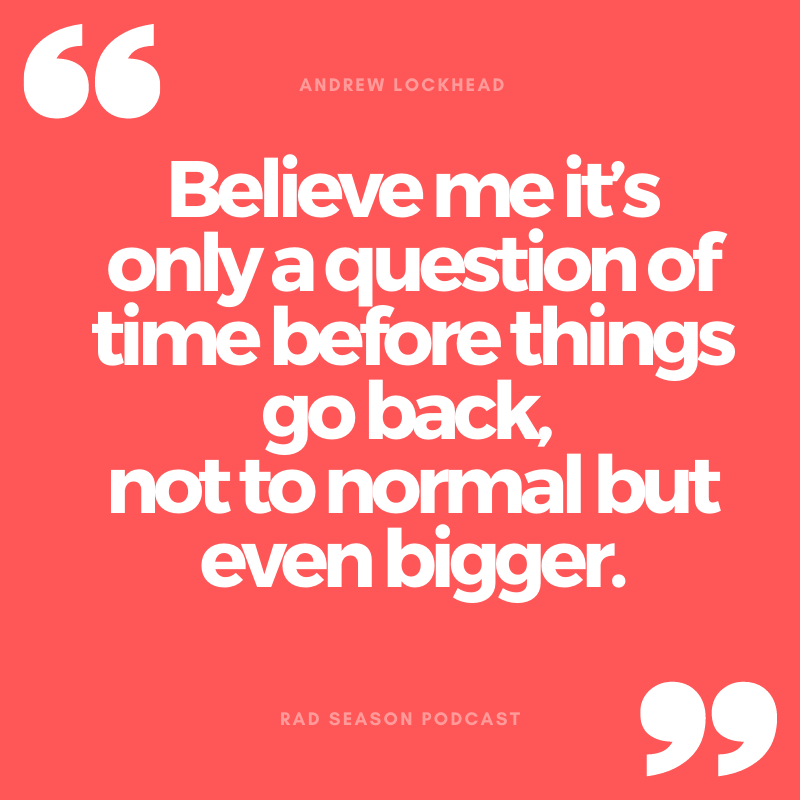
People have been inside for months now. They just want to go and attend some events.
Airbnb vs Hotels
Oli: What are you seeing say with the first one. Airbnb and with hotels? Are people trusting Airbnb or are they gonna go stay in a hotel?
Andrew: At first in March we saw people were booking more hotels. So all of the sudden hotels were up. And after running some customers surveys, we find out that the reason why is because hotels felt safer and more professional. Hotels have cleaning teams in them to make sure that their sheets are going to be pretty, everything is going to get clean and sanitized compared to Airbnb.
Then a couple of months ago, we saw the exact opposite going around. Airbnb was boosting back up. We saw that hotels were going from 40% to 27%. People are willing to go away for a longer stay. They like to have a kitchen. Airbnb made much more sense for most people.
Oli: I guess you feel that you don’t have to go out as much whereas if you’re in a hotel room, you’re going to be going out for lunch and dinner.
Andrew: You’re going crazy in your small hotel room whereas you can have a terrace in your Airbnb.
Booking Window
One thing that we saw as well was a trend regarding the booking window. So at first we saw that people were booking much closer to the event because they can feel like they can cancel if it’s not going to happen, or at least have a better understanding. Now we saw that the booking window moved from 41 days to 82 days so exactly double. People are obviously taking the choice of free cancellation. They’re taking advantage of all the programs that they have in place as of now.
Oli: That’s what we’re seeing almost from this month. People are booking for next year. They are taking a punt that hopefully the vaccine comes and the events, carnivals and festivals can happen again in June, July, whenever it may be. They book now and if there’s a free cancellation policy then it’s worth It.
Andrew: It just makes more sense for them. For those who would like to reserve in advance, there’s absolutely no problem with this. So that trend is only going to keep going up, I believe.
Domestic vs International Travel
Oli: What about domestic and international travel? Are people just going to go and explore their own neighborhoods or state? Is that something you’re seeing?
Andrew: Yeah, actually it is. So there’s a bit of difference. Europe is so strange because all of those countries have their own behavior. So something that we’re going to see in the UK will probably not be represented at all in France, or Spain. So we need to treat all of them differently to know exactly what’s happening and how a country reacts. Sometimes it’s about local regulation and policy. It can be about the way communication has been done through the media.
We’re tracking all of those countries, side by side. The surveys we’re reading like the one from Ticketmaster, about 5000 people replied.

So we’re getting safe inside our own small place, people just want to explore and go out. But you’re 100% right. It’s much more about local travel. People don’t want to take a plane, they want to take their car.
More people are ready to move but they are also more concerned. The jump is about 31 to 40% of people getting extremely concerned about the Coronavirus, especially in the States. Is it because of Trump or what’s happening around. I don’t know, I can just tell you that it’s going up.
Oli: What about Canada?
Andrew: Actually Canada is doing better. Canada in that sense is feeling safer. I don’t know exactly why. They do have more bookings. People are getting less concerned and have less fear about Coronavirus so they’re doing more bookings.
Oli: With the events industry, is there a trend to run smaller events? Are they putting measures in place? Or are they saying for 2020 we’re done, we’re going to reschedule for 2021 or 2022?
Andrew: 2020 is pretty much over.
I’ve been talking to a few event organizers, ticketing platforms and promoters. Even though they’re trying to push back the date, they know now that it’s not going to happen anymore. So everything has been postponed. The good news about this is people are still ready to attend those events.
Ticketing platforms that decided to offer money-back guarantees are getting a massive bump right now.

The only thing you need to do is set a calendar reminder for the invite. If it’s happening wonderful, if it’s not too bad you get your money back.
Oli: Pretty risky for the platform and the organizer.
Andrew: It is but what else can they do? People are not going to purchase those tickets otherwise.
Product Innovation and Development
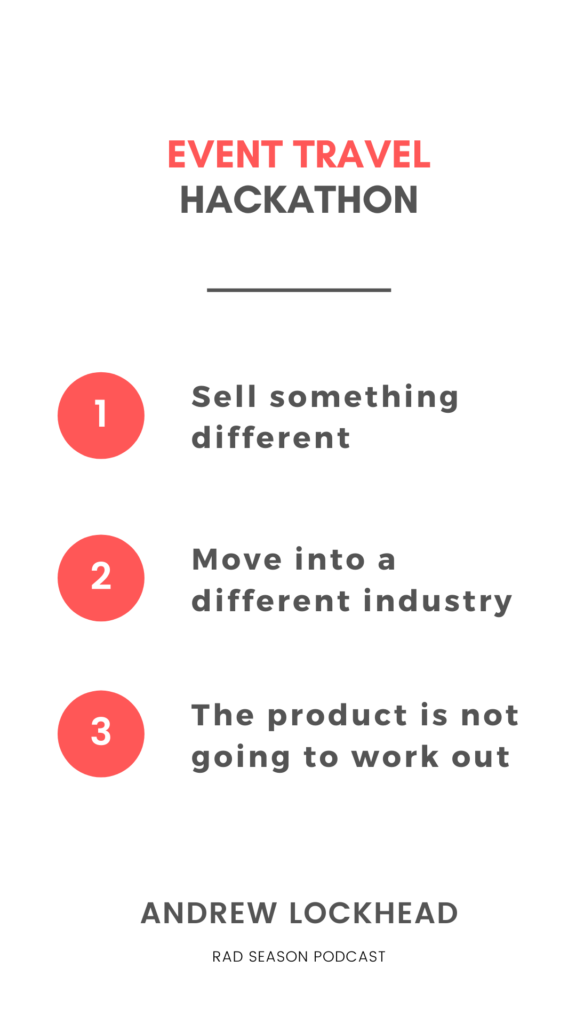
Oli: Between March and now what did you do as a company? Any additional products or features?
Andrew: We started to cry all together.
No, we do have an amazing team. So what we decided to do in the first few days after the virus, we decided to host a Hackathon with all of the teams combined.
For people that don’t know too much about hackathons, it is when you decide to work on specific projects. So you mention a problem and people get in smaller teams to work on that specific project. They present their results at the end of the day. All of our teams decided to split into a team of two or three, and they were working on something that they thought could be relevant for the virus. Out of the 12 projects that came out of it, three of them were actually implemented.
The problem we picked was the Coronavirus and finding a solution. We decided on three angles:
- We sell something different. Another product or service to our customer base. – This didn’t work very well because our customer base is not having any type of revenue right now. They’re not ready to buy anything.
- We move into a different industry. – If entertainment is going down and travel is not going to bounce back up, who else can be interested in this? We launched in the retail space where we can sell after someone purchased. It could be a book, sheets or electronics. We moved our product into that segment of the industry.
- Our product is shit, it’s not going to work out. The industry is over. If true what can we do?
We still have an amazing team of people who’ve been working together for years. Those people are developers and hackers. How can we make them work on something else that we never did in the past? We’re still working on a few projects out of that.
It’s been hard. I’m not lying. We had to let go of amazing people. We had to make difficult decisions. But in the end, it was best of the company in the long term.
Oli: Are you guys focused on 2021 and almost setting another vision or roadmap for next year?
Andrew: We’re having right now three different scenarios. A best-case scenario for investors, a worst-case scenario where we have to become a zombie company and in between.
Obviously, if there’s a vaccine if there is a remedy coming out of that it will have a major impact on what’s going to be happening for 2021. Travel is such a resilient industry, it represents roughly about 15% of the GDP worldwide, it’s going to bounce back up. I think it’s going to bounce back up massively, probably not the same as before so maybe not as much corporate travel. People will not travel as much for business, might be more local events, let’s say 250 miles and less.
So this is what we’re planning right now. More local events, people exploring their own cities and their own countries way before going 5,000 kilometers away.
Oli: We’ve just got to see what happens.
Andrew: What’s happening on your side? Have you been doing something similar as well planning for 2021?
Oli: We’re putting everything in place for next year. So most of the events that we have on Rad Season, have released their dates for next year. All the big music festivals, the Oktoberfest’s of the world, you know, like some of these events have been running for hundreds and hundreds of years, they’re not going to stop. They may take a break for a year or two. Like Wimbledon tennis and the Olympics getting canceled and stuff like that this year, things will come back.
For us, it’s just getting ready for when they do. We’re building our content and making sure that what we have on the site is the best information that we can provide for people that are then looking to go to these events when they start again.
I was getting pretty excited this year. I had a festival planned every month. We were going to be doing a lot of road trips. We moved the company to Portugal and we were going to Spain every month. I had some crazy festivals planned there. We will have to do it next year, so we’re looking at that.
We’re looking at virtual events as well. A lot of organizers are kind of either doing a hybrid or they went fully virtual if they can’t run a physical event. So we’re showcasing what’s happening for online festivals and virtual events as well.
Andrew: You’re not going to get the same type of vibe or experience or anything that’s close to it. That’s why I feel like it’s only a band-aid. But as soon as we’ll be able to attend those events in person it’s going to be much more relevant to us.
Oli: I think so. People are itching. I just want to go out and see some live music. Last year I did 30 festivals.
Andrew: It’s coming back. I spoke to someone in Moscow just before this and they had a gathering of about 500 people. People are attending and they’re actually overselling the tickets.
Oli: It’s interesting, here in Europe obviously different countries have different rules. Looking at what things are in place, social distancing and restrictions that can actually make their events happen.
There are things going on in places like Serbia, they just had one of their big events in Belgrade, a beer and music festival. So there’s stuff that’s happening. Obviously, the massive ones with 30,000 plus people, like throwing tomatoes at each other, and everyone’s climbing on top of each other, those things are gonna have to wait.
Andrew: We’ll get new regulations in place, there’s going to be a way. They’ll find out how to get those things going because people are just hungry for them. They’ll find a way to buy either a bracelet or an electronic passport. I’m not so stressed. It’s coming back.
Oli: What’s the best way for everyone to find out what Stay22 are doing?
The best way is to follow us on LinkedIn or Twitter. Most of the time, you can just reach out to the team on Facebook, we’re super easily accessible.
We’re always open to new things at Stay22. So if you have any type of idea or recommendations or are actually looking for a job, we’re always hiring great talent. So we’ll be more than happy to have a chat with you.
Oli: Cool, man. It’s been good chatting to you.
Andrew: Thanks for having me.
Watch the video:
Missed the last episodes? Check them out!
Episode 19: Motoclimb – Matt Musgrove
Episode 20: Freeride Mountain Biking – Darren Berrecloth
Episode 21: Simple Session – Risto Kalmre
Last updated on May 17, 2025Have you subscribed to our Newsletter or Podcast? Listen to us on Apple Podcast and Spotify and follow us on Facebook, Instagram Twitter and YouTube.
Accommodation near Montreal, Canada
Rad Season is providing you with rentals and hotels at the lowest prices available online. Book your stay near Montreal, Canada using the map below!
